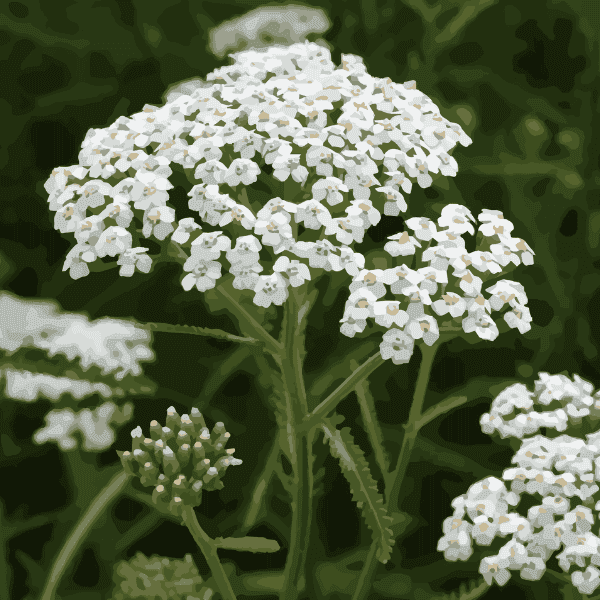
Yarrow Flowers {Organic}
Yarrow is a perennial herb that is anti-inflammatory, supports digestion, and supports the immune system. Traditionally, it has been used in herbal medicine for a wide variety of conditions, including being used to treat soldiers' wounds throughout history, as it is believed to support wound healing, stop bleeding, and soothe pain and general inflammation.
Yarrow is sometimes referred to as milfoil, nosebleed, soldier’s woundwort, carpenter’s herb, stop-bleeding herb, or by its scientific name Achillea millefolium. In fact, its scientific name, Achillea, refers to the warrior Achilles in Greek mythology, as he used yarrow to treat his soldiers’ wounds, hence why it’s sometimes referred to as soldiers’ woundwort. Yarrow is a strong-smelling perennial herb that grows about 20 inches long with clusters of white, flat-topped flower heads that appear from June to November.
You might need yarrow if . . .
- You have a minor wound
- You are dealing with digestive issues
- You are feeling stressed
Benefits of Yarrow
- May Promote Wound Healing
- Anti-inflammatory Properties
- Supports the body’s natural healing processes
- Supports a healthy stress response
Common ways to use Yarrow
You can find yarrow in dried bulk, pills, powders, teas, extracts, or tinctures.
🌿Try making herbal extractions or learn about how yarrow is great for the lymphatic system! ← 🟩 DIYs, recipes, and more!
Growing and Foraging Information
Yarrow is a hardy perennial herb that thrives in well-drained soil and full sun, often found growing wild in fields, meadows, and even along roadsides. When foraging, look for its whimsical fern-like leaves and small clusters of flowers, usually white or pink. They bloom in the summertime – be sure to identify them correctly.
Safety Concerns
Drug Interaction: If you have any health concerns or are taking any prescription medication, please consult with your healthcare provider before adding new herbs to your diet. It could affect blood pressure meds, anticoagulants, diabetic medications, or sedatives.
Breastfeeding and Pregnancy: Trusted herbalist Richard suggests avoiding yarrow in pregnancy unless you can be sure that the variety you are using is low in thujones. You would likely have to take a great deal of yarrow to run any risk of lowering birth weight, and there is no evidence of any other harm being likely. Yarrow appears very safe to use while breastfeeding.
Other Concerns: The mainstream seems very anti-yarrow, claiming that although yarrow is commonly consumed in foods, yarrow products that contain thujone might not be safe, claiming it is poisonous in large doses. They also claim there isn’t enough reliable information to know if yarrow is safe when applied to the skin or for breastfeeding.
Select Studies About Yarrow
Studies show that Achillea and its flavonoids may help treat brain disorders like epilepsy, Alzheimer's, Parkinson's, multiple sclerosis, and stroke. Most research has been done in labs or with animals, but the results suggest they have few side effects and could be useful as supplements for neurodegenerative diseases.